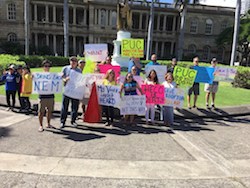According to a new poll from the The Alliance for Solar Choice (TASC), in Hawaii, a majority of respondents support political candidates that support solar development as well as rooftop solar. In addition, a majority said they oppose the Public Utilities Commission’s (PUC) recent decision to eliminate solar net metering, the fundamental policy for rooftop solar growth according to TASC.

Solar supporters rally in front of the Hawaii Public Utilities Commission (PRNewsFoto/The Alliance for Solar Choice)
Solar supporters erected a large megaphone to demonstrate the desire for public participation. “I support greater solar growth,” said Charlie Jeffries who attended the rally. “I’m disturbed that the PUC made a rash decision without giving the public an opportunity to make our voices heard.”
“The Hawaii Public Utility Commission failed to do a study of the costs and benefits of solar,” said Roy Skaggs, also a rally attendee. “How do you make sweeping decisions that impacts thousands of families and jobs without at least knowing the data?”
Those speaking at the rally share the public’s sentiment. A nearly-universal 97% of poll respondents support more rooftop solar in Hawaii.
“The public overwhelmingly supports rooftop solar and believes that Hawaii is moving in the wrong direction on energy policy, but policy makers are not listening,” said Bryan Miller, President of TASC. “This poll shows that Governor Ige and the Commission are ignoring the voices of their constituents.”
The Commission is currently developing optional time-of-use rates that could encourage families to invest in rooftop solar with battery storage, and then export power in the evenings when the grid needs the power most. This is the first opportunity to see if the Commission will change course in light of the overwhelming public support for more rooftop solar.
“Governor Ige must show clear leadership and support rooftop solar,” said Miller. “At the end of the day, the buck stops with him. The public can’t elect Commissioners. The public can only look to the Governor.”

